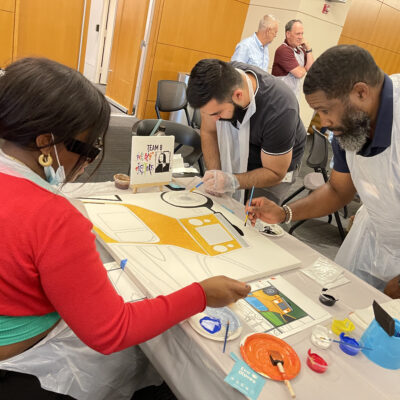How To Build Trust in the Workplace: A Guide for Leaders
Building trust in the workplace is a foundational step to fostering a strong and productive team. But unfortunately, only 21% of U.S. workers strongly agree that they trust the leaders within their organization.
This is concerning—a team that trusts its leadership will be more comfortable, cohesive, and confident, which leads to greater success and better communication.
Ultimately, developing trust in the workplace is crucial for achieving maximum success.
In this article, we’ll break down the basics of trust and teamwork, explain why it matters, and provide guidance on how to build trust in the workplace.
Why Is Trust Important in the Workplace? Top 5 Benefits
Before we jump into trust and team building activities, let’s take a quick look at why building trust at work is so important for the success of your business.
1. Trusting Employees Are More Loyal
Just like any relationship, trust and loyalty are non-negotiable for a healthy dynamic between team members and leaders.
If employees don’t completely trust you and your business practices, they’re likely not going to fully commit to the company. Instead, they’ll hold back and be at a greater risk of employee burnout due to their fear of things like:
- Being let go without reason
- Getting taken advantage of or not having their time respected
- Feeling underestimated and underappreciated
Trusting employees, however, are willing to go the extra mile and stay loyal to the company because they know their leaders always have their best interests in mind.
2. Trust Creates Future Leaders
Developing trust in the workplace also empowers employees to seek out growth opportunities and further their success within the company.
Instead of looking elsewhere for better employment opportunities, trusting employees will aim to become leaders within their current team.
After all, why leave a company that values you when you can stay with that company as you advance? If you already trust your employer and leaders, moving to a new company puts you at risk of losing this valuable relationship.
3. Building Trust Boosts Employee Engagement
By fostering open communication and creating a positive work culture, leaders can significantly boost employee engagement.
When employees have trust in leadership, they’re more likely to voice ideas, give feedback, and work together to go above and beyond the company’s baseline goals.
Employees who feel like they can take risks without being punished are also more likely to innovate, which helps keep them highly engaged with the company for years to come.
4. Employee Trust Improves Client Trust

Just as trust and transparency positively impact your employees, they also influence your clients’ experience. TeamBonding’s Founder and COO, David Goldstein, explains his approach:
“In order for our clients to trust our business, we have to trust the employees to deliver on the promises that we make. To me, it’s important to build trusting relationships with my employees and invest in their success so they treat our business as if it’s their own.”
Customers can tell when your employees are passionate about their work and feel like they’re respected at your company. Ensure you’re building trust in the workplace so that employees feel empowered to perform at their best and build rapport with clients.
5. Trust Prevents a Toxic Workplace
A lack of trust in the workplace can lead to a toxic work environment and lead to a range of negative consequences:
- Employees who experience more insecurity, stress, and communication anxiety.
- Teams that suffer from unhealthy behaviors, such as gossiping, spreading rumors, and extreme competitiveness.
- A workplace with increasingly low morale and a negative attitude that spreads from person to person.
These are all signs of a toxic work environment, which a lack of trust can quickly lead to if left unaddressed. Those environments are inefficient, ineffective, and unenjoyable for everyone involved.
On the other hand, when you maintain a trusting environment with healthy communication and a positive company culture, you prevent this toxicity and protect the mental health of your team members.
If you want your company to achieve its goals, it’s essential that you foster an environment of trust and prevent your workplace from becoming toxic.
Why Building Trust in the Workplace Isn’t Easy: Top 3 Challenges
Sure, it’s easy to say you need to build trust, but knowing how to go about it is another story.
Building trust at work can be difficult, and it’s not something that comes overnight.
It can take weeks, months, and sometimes years for leaders and companies to build or regain trust.
Below, we’ll review some of the most common challenges to building trust in the workplace. If you can relate to these within your company, chances are good that you could stand to focus more on trust and teamwork.
1. Lack of Transparency
One of the most common obstacles to building trust in the workplace is a lack of transparency, especially from management.
Issues begin to arise when employees don’t know what’s going on. People might wonder why a decision was made, worry about their job security, and get more stressed. All of these issues have clear negative impacts on the work environment.
Deloitte’s 8-part series, “The Chemistry of Trust,” highlights several companies that have recently experienced adverse trust-related incidents. The results were staggering.
Each company’s market cap was eroded by 20-56% with losses accounting for a combined $70 billion in value.
On the other hand, transparency makes trust much easier to build.
When employees feel like they know what’s going on, understand why decisions are made, and clearly understand the company’s actions, it makes it much easier to trust the company and their coworkers.
Trust and transparency also help them feel engaged and involved, which can improve morale and productivity.
2. Poor Communication
A lack of communication is another common obstacle to building trust in the workplace. Clear and consistent communication goes a long way when it comes to trust and teamwork.
When communication breaks down, relationships become harder to build and maintain, and employees can get confused and stressed.
However, good communication makes all the difference. With communication, leaders can build strong relationships with their teams. Employees feel like they are cared about, included, and can communicate their struggles with their coworkers.
In a recent episode of our Team Building Saves the World podcast, “Leading With Trust,” Melissa Richards—a leadership coach and author—shared some powerful insights on this topic:
“It starts with individual communication preferences. Understanding how each person communicates best helps create team-wide norms that foster trust and prevent unnecessary conflict,” explained Richards.
3. Trust Goes Both Ways
Another all-too-common obstacle to building trust in the workplace is when leaders forget that trust goes both ways. Trust is not a one-way relationship, and it must be earned.
Upper management cannot expect trust from their employees without putting in the effort to show that same trust to their team members. They must lead by example and show that their employees can trust them before they can expect to be trusted.
Management and leaders can start building trust in the workplace by being more transparent, communicating more openly with employees, and emphasizing psychological safety.
“Leaders need to create environments where it’s okay for projects to go off track—where people aren’t devastated or feel personally responsible, but instead feel motivated to work together to get back on course,” adds Richards.
By trusting your team, even when they make mistakes, you’re demonstrating that you:
- Value their input
- Want them to be involved
- Won’t hold their mistakes against them
- Trust them with important information and projects
- Find trust and communication more important than perfection
You must also stick to your word as much as possible. If you say you will deal with an issue, promise a raise, or plan on a bonus, you need to follow through.
When employees see you put your trust in them, they will do the same.
How to Build Trust in the Workplace
Now that we’ve discussed the benefits of building trust in the workplace and the most common challenges you might encounter, let’s explore how you can get started fixing the matter.
Here are a few strategies and tips for building trust in the workplace so you can benefit from happier, healthier, more productive employees.
1. Effective Communication and Transparency
Communication and transparency go hand in hand, and they’re an essential part of building trust in the workplace.
Over 80% of Americans feel that communication is a key factor in building trust at work. Employees need to be able to communicate freely with each other and management, and management needs to communicate freely with their teams.
Effective communication also fosters—and requires—transparency. Communicating your decisions, changes, and thought processes makes you more transparent, which in turn helps build trust with employees.
When you do this, your team will feel included and informed about what’s going on, and this makes them feel trusted. As we mentioned earlier, when your employees feel trusted, they’re much more inclined to give that trust in return.
2. Active Listening and Empathy
Empathy and listening are fantastic ways to build trust among your team members. These two skills rely on each other if you want to get the full benefit from your efforts.
“It starts with empathy, which includes listening. Listening to others. Showing respect for their personal history and strengths,” says Richards. “Empathy isn’t always natural, but you can be committed to practicing it through curiosity and care.”
Active listening goes beyond simply hearing a person’s words. It involves:
- Giving your full attention: It’s essential to be present in conversations—try to maintain eye contact, use open body language, and eliminate all distractions so your whole focus is on what’s being said to you.
- Show that you’re listening: Use small verbal cues, such as “I see” or “go on,” when your team member is talking to you. Nod occasionally and mirror their emotions appropriately as well—this encourages employees to be open.
- Avoid interrupting: It’s common in casual speech with friends to interrupt, but it’s antithetical to active listening and generally a bad practice in the workplace. Let the speaker finish their thoughts and resist the urge to jump in.
- Reflect and paraphrase: Before giving your thoughts, or even planning what you’ll say, repeat back what you heard in your own words to make sure you’ve understood correctly.
- Ask clarifying questions: Questions like “Can you tell me more about that?” can help you gently probe for more profound meaning and clarity, which shows that you’re interested and helps you better understand the speaker.
- Acknowledge emotions: Always validate how your team member is feeling, even if you don’t agree. For example, you might say: “It sounds like this is all really frustrating for you.”
- Respond thoughtfully: Once you understand the speaker, pause before you reply and then offer feedback or input that reflects what they shared with you.
Yes, that was a lot of steps, but it all comes down to being an empathetic and active participant in a conversation. Take the time to develop these skills, and you’ll see significant changes in the level of trust your team members place in you.
“You don’t have to always agree with someone’s perspective to be empathetic—but you do have to be willing to hear and honor it,” adds Richards.

3. Take Accountability
Accountability is often overlooked when it comes to building trust in the workplace, but it’s incredibly important.
“Leaders should bring their whole selves to work—mentally, physically, and professionally—and encourage their team to do the same,” Richards explains.
Lack of accountability is one of the quickest ways to lose trust, and having a culture of accountability is a great way to develop trust at work.
When leaders and management aren’t held accountable, employees lose trust in the company, especially if there are double standards (meaning that employees are held accountable while leaders aren’t).
When accountability is present, employees feel like they can trust their leaders to do the right thing and stand up for them. Make sure team members can see the leaders taking accountability for their own mistakes.
It might help to make accountability a team effort and ensure that even leaders have accountability partners.
“We all need accountability partners—not just to get work done, but to make sure we’re not carrying more than we should,” adds Richards.
4. Inspire Confidence in the Future
Most employees don’t feel that their leaders keep them informed about the reasoning behind their business decisions. Similarly, only about one in five employees is highly confident in their leaders’ abilities to manage upcoming challenges and crisis situations.
This is concerning because leading through change is tough when your team doesn’t trust your decisions, which is more likely to occur if they don’t understand your reasoning.
While employees don’t need your entire plan in detail, they do need to understand why they’re coming into work every day and the steps they must take to achieve company goals or weather a crisis.
“You can’t just run across the bridge and shout back. You have to usher people through the crisis, step by step, at their own pace,” says Richards.
It’s also important to highlight successes as you go—this helps employees see the path forward and believe that the team will continue to achieve future success.
5. Build Personal Connections
Lastly, you need to build personal connections to develop trust—trust needs relationships to build upon, after all.
Things as simple as asking your team members about their hobbies, helping people out, and being friendly at work can help build personal connections.
Building trust in the workplace becomes much easier when you know your people on a personal level.
“Building trust starts with relationships. People trust people,” explains Richards. “You cannot build organizational trust unless you start with relational trust.”
Building personal connections can seem intimidating, but it’s relatively easy if you’re taking advantage of the many resources available to help you make these connections. One of the best resources is team building exercises.
Trust and Team Building Activities
Trust-building exercises are among the most effective ways to foster a culture of trust at work. These activities can help you build relationships, strengthen bonds, improve communication, and develop trust.
Consider using these team building trust activities in the workplace:
- Team Pechakucha
- Two Truths and a Lie
- Crescendo
- Dining in the Dark
- Customizable virtual training programs
- Willow in the Wind
- Icebreaker questions
- Team reflection meetings
Start Building Trust Today
Trust is an important building block of any successful workplace. With it, your employees will have better morale and improved productivity, and your workplace will be a more positive and welcoming place.
While building trust in the workplace can be challenging, effective communication, transparency, strong personal connections, and accountability can help you overcome the most common obstacles you’ll face.
Remember, trust and team building activities go hand in hand, so why not start building trust today with TeamBonding?
We have over 200 events and programs to help you develop relationships, and over 25 years of experience making magic happen.
Contact us today to find a team building program that will help you create a culture of trust, positivity, and productivity.
Get more insights in our newsletter:
* every subscription supports charity!
Plays well with these activities.


 Unlock exclusive resources for better teams. Every subscription supports charity!
Unlock exclusive resources for better teams. Every subscription supports charity!
Create Your Free Account
Get exclusive access to new programs from the TeamBonding Lab, save your favorite ideas, and track your upcoming events.
Already have an account? Login











